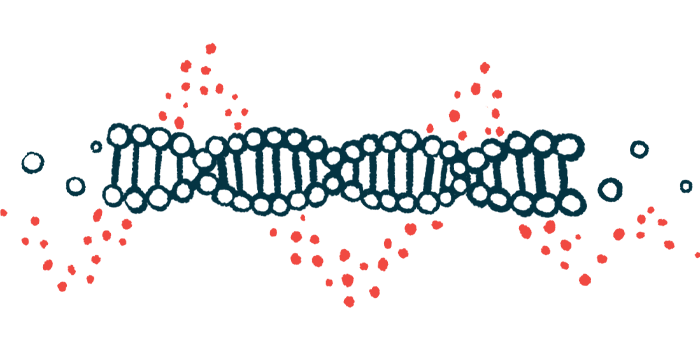DSP Gene Variant May Aid Survival in IPF, Guide Esbriet or Ofev Use

Certain genetic variants appear to lead to better survival in people with idiopathic pulmonary fibrosis (IPF) who are on anti-fibrotics, suggesting that genetic testing may help to select patients for specific treatments, a real-world study found.
Specifically, people carrying a variant of the DSP gene, known as the rs2076295 (G) allele, may benefit most from treatment with Ofev (nintedanib). In turn, those carrying two variants of the rs2076295 (T) allele (TT genotype), may benefit most by using Esbriet (pirfenidone). (An allele is one of two or more versions of a gene, in this case the DSP gene; people with two of these versions, like two T alleles, are said to have a TT geneotype.)
The study, “DSP rs2076295 variants influence nintedanib and pirfenidone outcomes in idiopathic pulmonary fibrosis: a pilot study,” was published in Therapeutic Advances in Respiratory Disease.
Genetic variability is known to influence how a patient’s disease evolves and responds to treatment. With IPF, however, it is not clear how common variants linked with disease development, such as those of MUC5B (the gene containing instructions to make mucin 5B) and DSP (the gene containing instructions to make desmoplakin), may affect response to treatment.
Researchers in Italy previously reported that a variant of the MUC5B gene, known as the rs35705950 (T) allele, may be linked with better survival in IPF patients on anti-fibrotics, although it may not affect response to treatment.
Now, a team in the Czech Republic used records from the European MultiPartner IPF Registry (EMPIRE) — a large multicenter database of people with IPF — to search for a link between genetic variants and response to anti-fibrotic therapy.
The study included 210 patients who were part of the Czech section of the registry: 139 men and 71 women. Their median age at diagnosis was 70, ranging from 52 to 82 years old. A total of 167 (79.5%) were taking anti-fibrotics; of them, 127 (76%) were prescribed Esbriet and 40 (24%) Ofev.
Also included were 205 age- and sex-matched individuals receiving at-home care — but without chronic lung or autoimmune disease, or cancer — who served as controls: 125 men and 80 women with a median age of 70, ranging from 51 to 88.
Genetic testing of blood samples revealed that the MUC5B rs35705950 (T) allele was more common in patients than in controls (55.3% vs. 20.9%), as was the DSP rs2076295 (G) allele (80.4% vs. 68.3%).
Mortality tended to be lower in patients carrying the MUC5B rs35705950 (T) allele who were on anti-fibrotics than in those who were not. A comparison of patients carrying the variant T allele and those with two G alleles (GG genotype) found no differences in mortality or in response to Esbriet or Ofev treatment.
“MUC5B rs35705950 did not impact the outcome of treatment with either nintedanib or pirfenidone,” the researchers wrote.
When the team focused on the DSP rs2076295 (G) allele, they found that it was linked to better survival in patients taking anti-fibrotics.
Compared to patients carrying the TT genotype, those carrying the DSP rs2076295 (G) allele benefited most from treatment with Ofev (vs. Esbriet), as seen by a longer overall survival — or the time they live since starting treatment — and a slower decline in lung function.
How the DSP rs2076295 (G) allele might affect response to treatment is still unknown.
Patients carrying the TT genotype, in contrast, benefited most from treatment with Esbriet (vs. Ofev), as seen by a longer overall survival.
The researchers also looked for possible predictors of a favorable disease course. They found that factors like older age and better lung function — as measured by forced vital capacity (FVC) and diffusing capacity for carbon monoxide (DLCO) — at the time of diagnosis were linked with longer survival.
“Taken together, our real-world study showed that IPF patients with MUC5B T* allele or DSP G* allele profit from antifibrotic treatment (nintedanib or pirfenidone) by longer survival,” the researchers concluded. “Our study … may help to identify genetic subgroups likely to benefit from a particular antifibrotic therapy, as desired in the era of precision medicine.”
They noted, however, that these findings should be confirmed in further studies.








